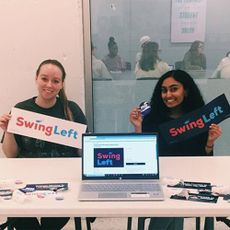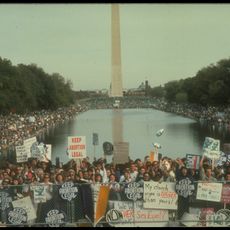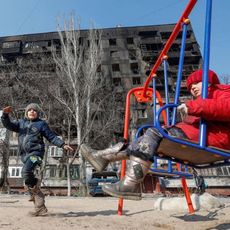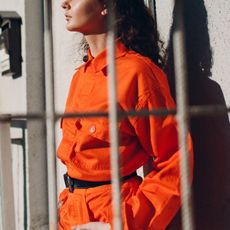My Family and I Live in Navajo Nation. We Don't Have Access to Clean Running Water
"They say that the United States is one of the wealthiest countries in the world. Why are citizens still living with no access to clean water?"

Amanda L. is a 36-year-old mother of five currently living in Thoreau, New Mexico, on the eastern side of Navajo Nation—the largest Native American territory in the United States. For as long as she can remember, she and her family have not had access to clean running water—a basic human right that approximately 30 percent of families across Navajo Nation don't have. Bottled water is rarely accessible either: There are only about 13 grocery stores across Navajo Nation, which spans 27,000 square miles, and it's often sold out. The COVID-19 pandemic has presented even more challenges for Amanda, her family, and other people living in Navajo Nation in order to access water to drink, cook, and bathe. Here, in her own words, Amanda shares what it's like living without access to clean running water, and her call-to-action for political leaders.
I live in Thoreau, which is a rural desert area in New Mexico. The nearest town grocery store and gas station is about six miles away. My husband and I have five kids ages 16, 15, 10, 6, and 4 months. I've been on Navajo Nation’s waiting list to get on to the water line for the past four or five years now, but it’s difficult because the aquifer in the area is running out so they can’t supply everyone with water.
In the meantime, the nonprofit organization DigDeep has helped. They put a big 1,200-gallon water tank in the ground and installed a pump for me. That really is just for my kitchen and drinking water. For showering, we borrow water from St. Bonaventure’s supply, which is at least five miles away, and we bring it back to the house in five-gallon buckets. [Editor’s note: DigDeep works with St. Bonaventure to expand on their existing work. DigDeep does the installation of the barrel and pump. St. Bon's is where the water trucks fill up as they have a water access point.] We heat up water on the stove. Our showers are usually only three to five minutes long. For the bathroom, we rent from the Water and Sanitation Department in Gallup, New Mexico, which costs us about $100 per month.
I found out about DigDeep through a coworker who worked with St. Bon. I applied for the home installation, and within a week it was installed. It was a blessing to me because I didn't have to go every two days to get water. I didn't have to put my kids through heavy lifting. We could go straight home and start dinner like any normal family would, instead of going to the water source and hauling water back home.

A water jug sitting in the kitchen of Amanda L.'s home, where her family has no running water, on May 22, 2020.
Before DigDeep installed my home water system in 2018, we would haul 25-gallon buckets every two days to retrieve water. As soon as I got off of work, I went to St. Bon, filled up the water, parked behind the house, put the water in, and then heated up the water to get dinner started. Even if it was snowing or raining, we had no choice but to get it because if we didn't get it within two days, we would run out of water on the third day.
We tried to not let that happen, but there were times that we did run out of water. We would have to ask relatives to use their hose just to get us by the next couple of days until we could go back and get the water from St. Bon until DigDeep put in that big water tank at the bottom of the ground. Now we go once per week with the big 1,200-gallon barrel and that's it. To do this, we have to make time. My husband and I both work. Gas prices are going up. Food is going up. We have to plan it out like, "OK, you're working this time. I'm working this time. This is the only time we can go get water."
It was hard. My oldest children were about 8 or 9 years old at the time. They knew they couldn't stay for practice. They knew they couldn't do any extra activities because we had to get water and carry it back inside. We’re not able to turn on a faucet like any normal family would do to get a glass of water or take a shower. It was difficult to see my kids wash in the tote. It’s still hard to this day. My kids’ generation is living without water. To me, it's embarrassing. It’s shameful. But as parents, we have to work hard and do what we have to do for our kids.
Stay In The Know
Get exclusive access to fashion and beauty trends, hot-off-the-press celebrity news, and more.
We’re not able to turn on a faucet like any normal family would do to get a glass of water or take a shower.
Nobody in the community wants to let anybody know they don't have water. It's kind of like you're on your own. You don't want people to look down on you. You don't want people to feel sorry for you, so you keep it to yourself. My kids are older now, but I still wish they could just turn on a shower without having to heat up water and to do all the extra stuff in order to get their day going. Even to get a glass of water, you have to do the hauling first, put the water in, wait, and then you have to be careful because you can’t use so much of it. It's sad as a mother when you have to tell your kids, "Don't use that water, use this water."
In July 2021, the pump broke in our home. We had to go every day during the height of COVID to get the water because our pump wasn't working. On a regular day, we would use five gallons just to wash up and then the other two for cooking and cleaning. And then we would have to go get some more that same day. I had to expose my kids to COVID. [Editor’s note: A lack of running water has made it harder for Navajo Nation to fight COVID-19. The area once had the highest rate of COVID-19 infections per capita in the United States and still struggles with infections despite high vaccination rates.] I couldn't just have my kids stay home. We needed help. I needed help. So they would come with me and we would try to take precautions, like using gloves and keeping our masks on. For hand washing, we would just use one bucket. I would fill up water in a little glass that looks like you would make tea in, but it has like a nozzle at the bottom. So I would use that and then the bucket on the ground so my kids could wash their hands with that before they came into the house. It wasn't a recommended two- to three-minute hand washing. It was 15 to 20 seconds.
When the pump was finally replaced in January 2022, my kids were excited because we didn't have to go haul water every day. We didn't have to fight the heat and the cold. [Editor’s note: Due to COVID-19 safety protocols, DigDeep was unable to enter homes since the start of the pandemic. Once new regulations were in place, the DigDeep team was able to safely enter the home to complete the repairs.] We still had to get water, but it wasn't an everyday process.

A water pump is repaired outside of a home in Thoreau, New Mexico, on December 16, 2021 by the Navajo Water Project's DigDeep team.
There’s an aquifer less than a mile away from my house, but I can't hook up to it because that's the one they're trying to hook everybody up to again. Navajo Tribal Utility Authority (NTUA) still has to go through the procedures of testing it and getting all of the permits. I don't know if it will be next year. It could be in five years. I have no idea.
At the beginning of COVID it was, "We need water. We need water. We need water to make sure we are keeping ourselves clean, keeping our kids clean." And I was happy about that. I was glad to hear that Navajo Nation got that money from the federal government, too. But there are still people I know, including myself, who haven't got the opportunity to show Navajo Nation, "I need help." Nobody has come over and asked, "Do you need water? Is there something we could do?"
They say that the United States is one of the wealthiest countries in the world. Why are citizens still living in a third-world country with no access to clean water? They send so much money to help other people with these issues, but they need to stop turning a blind eye to their own citizens and try to figure out a way to help them. I’ve also heard comments like, "Oh, Native Americans are lazy. Native Americans are always looking for a handout." For most of us, that’s not how we are. Most of us have a job. Most of us try to make ends meet. Most of us do what we can for our families. We're human beings. There was so much taken from us in the past, and yet some of us are working paycheck to paycheck with no water. We're still surviving. We work as hard as we can. We shouldn't live like this.
Learn more about the Navajo Water Project and DigDeep.
-
 Do You Like Scary Movies? Because There Are A Lot of Exciting Horror Films to Look Forward to in 2025
Do You Like Scary Movies? Because There Are A Lot of Exciting Horror Films to Look Forward to in 2025Here are the buzzy A24 projects and sequels, including 'M3GAN 2.0,' that you need to see.
By Sadie Bell Published
-
 Justin Baldoni Claims Ryan Reynolds "Aggressively Berated" Him in a Meeting About Blake Lively
Justin Baldoni Claims Ryan Reynolds "Aggressively Berated" Him in a Meeting About Blake LivelyBaldoni's lawyers describe the alleged incident as an "inappropriate and humiliating berating" of the actor "delivered, perhaps intentionally, as other celebrity friends were coming in and out of their penthouse."
By Kayleigh Roberts Published
-
 Sabrina Carpenter Was Worried Releasing "Espresso" as a Summer Song Might Be a Mistake
Sabrina Carpenter Was Worried Releasing "Espresso" as a Summer Song Might Be a Mistake"I had literally no idea that anyone would like it, but I liked it, and that was kind of all that mattered to me in that moment, and something I try to remember over and over again," she says of releasing the song when she did in spite of her worries.
By Kayleigh Roberts Published
-
 36 Ways Women Still Aren't Equal to Men
36 Ways Women Still Aren't Equal to MenIt's just one of the many ways women still aren't equal to men.
By Brooke Knappenberger Last updated
-
 How New York's First Female Governor Plans to Fight for Women If Reelected
How New York's First Female Governor Plans to Fight for Women If ReelectedKathy Hochul twice came to power because men resigned amid sexual harassment scandals. Here, how she's leading differently.
By Emily Tisch Sussman Last updated
-
 Why the 2022 Midterm Elections Are So Critical
Why the 2022 Midterm Elections Are So CriticalAs we blaze through a highly charged midterm election season, Swing Left Executive Director Yasmin Radjy highlights rising stars who are fighting for women’s rights.
By Tanya Benedicto Klich Published
-
 Tammy Duckworth: 'I’m Mad as Hell' About the Lack of Federal Action on Gun Safety
Tammy Duckworth: 'I’m Mad as Hell' About the Lack of Federal Action on Gun SafetyThe Illinois Senator won't let the memory of the Highland Park shooting just fade away.
By Sen. Tammy Duckworth Published
-
 Roe Is Gone. We Have to Keep Fighting.
Roe Is Gone. We Have to Keep Fighting.Democracy always offers a path forward even when we feel thrust into the past.
By Beth Silvers and Sarah Stewart Holland, hosts of Pantsuit Politics Podcast Published
-
 The Supreme Court's Mississippi Abortion Rights Case: What to Know
The Supreme Court's Mississippi Abortion Rights Case: What to KnowThe case could threaten Roe v. Wade.
By Megan DiTrolio Published
-
 For These Ukrainian Women, Their Weapons Are Their Smartphones
For These Ukrainian Women, Their Weapons Are Their SmartphonesBy collecting cell phone video straight from the front lines, Dattalion shows the unfiltered horrors of the war.
By Maria Ricapito Published
-
 Sex Trafficking Victims Are Being Punished. A New Law Could Change That.
Sex Trafficking Victims Are Being Punished. A New Law Could Change That.Victims of sexual abuse are quietly criminalized. Sara's Law protects kids that fight back.
By Dr. Devin J. Buckley and Erin Regan Published